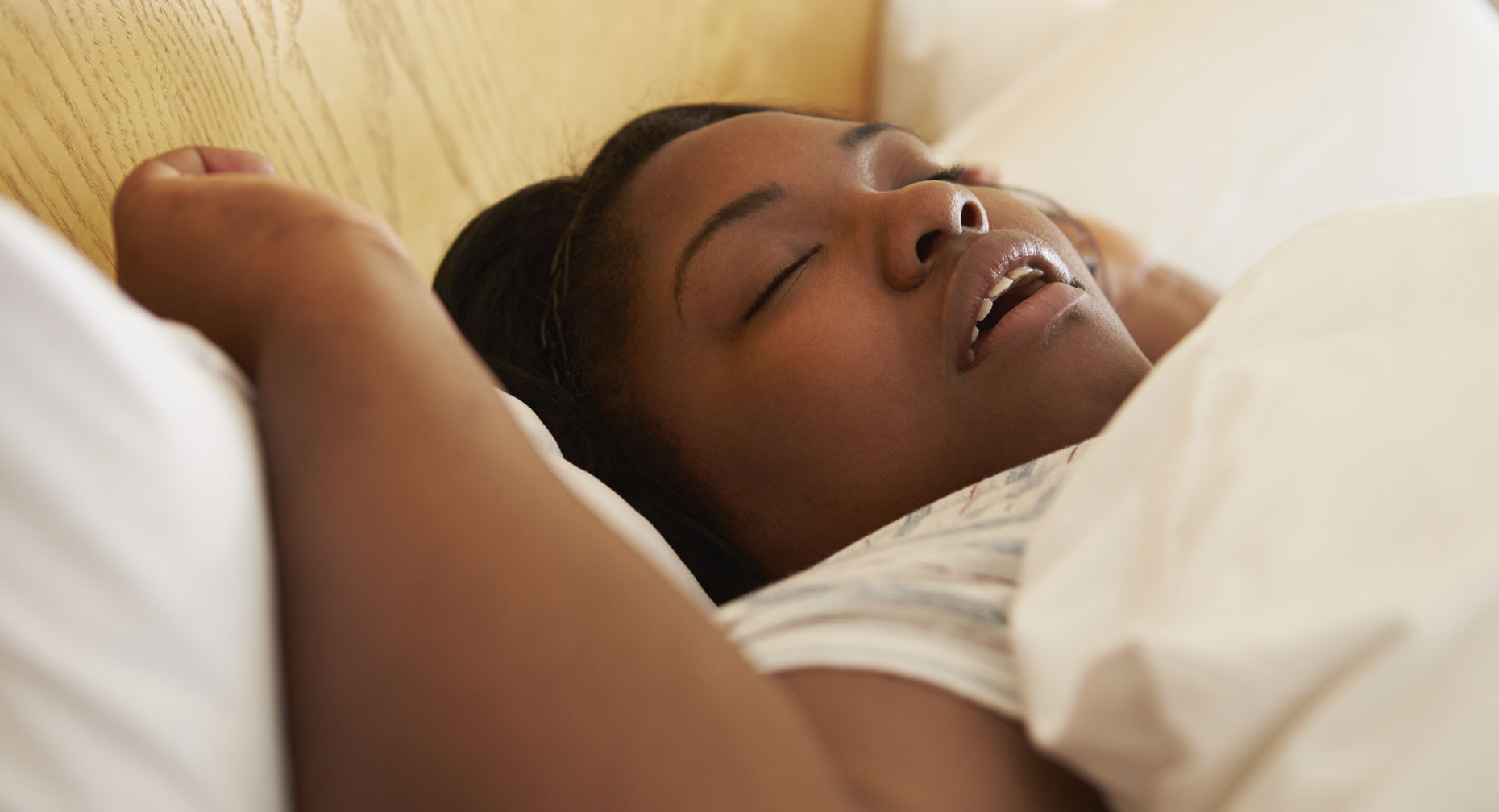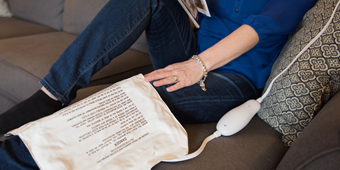A Simple Snore or Something More? Sleep Apnea and Snoring

Answer a few questions and we'll provide you with a list of primary care providers that best fit your needs.
If a mighty rumble emanates from your nose or throat while you’re sleeping, should you be concerned? Aside from the strain it can put on your relationship with your partner (and that’s enough cause for concern), that “snore” could be a sign of a more serious health problem.
If you gasp or gag or snort while snoring, you may have obstructive sleep apnea. But, how do you know for sure?
Snoring
“Snoring happens because when you breathe, the soft tissues of your neck can relax while you're sleeping and when they relax, they can narrow your breathing passage or your airway,” explains Angela Long-Prentice, MD, family medicine practitioner with Englewood Family Practice. “When it gets narrowed and then you try to draw in air, as you draw in air, it makes the tissue vibrate and then gives you kind of a vibratory noise and that noise is the snoring.”
Anything that narrows your breathing passages can cause snoring, including:
- Large tonsils
- An enlarged uvula (the tissue that hangs from the middle of the back of your throat)
- A deviated septum (when the thin wall between your nostrils is misaligned)
- Nasal congestion
- Excess weight
- Drinking alcohol
Learn more about the process and causes of snoring from Dr. Long-Prentice.
Click play to watch the video or read video transcript.
Everyone snores on occasion, says Michael Robertson, MD, MBA at Middletown Family Practice. “But estimates are that about 45 percent of males snore on a regular basis, and about 30 percent of females.”
Snoring can be a cause for concern in several instances Dr. Robertson says. “If you’re tired throughout the day, or if you don’t feel rested after a night’s sleep, you should seek advice from a medical professional. I’d also recommend seeing a doctor if you wake up with a headache on a regular basis, or if you have a very hard time getting your day started once you wake up.”
If you snore and also have other health issues like high blood pressure, Dr. Robertson suggests you talk to your doctor about it.
Learn from Dr. Robertson when your snoring is cause for concern, and what you can do to stop.
Click play to watch the video or read video transcript.
Obstructive Sleep Apnea
Not everyone who snores has apnea, but it is a key symptom. The difference is that, with obstructive sleep apnea, the snoring is accompanied by pauses where you literally stop breathing because your airway collapses or is blocked. These pauses, which can last from a few seconds to minutes, are followed by choking, snorting or gasping.
Obstructive sleep apnea is more common in people who are overweight, but it can affect anyone. The National Institutes of Health (NIH) report that between 12 and 18 million people in the U.S. suffer from this problem.
What’s the Harm?
Sleep apnea is a condition that is recognized as a lot more serious than previously thought.
People with apnea will stop breathing 30 times or more an hour. As a result, sleep quality is poor, the body is deprived of oxygen, and you can’t properly rid your body of carbon dioxide. This, in turn, can lead to excessive daytime sleepiness, headaches and numerous other health problems.
According to the NIH, obstructive sleep apnea can increase the risk of:
- High blood pressure, heart attack, stroke, obesity and diabetes
- Arrhythmias (irregular heartbeats)
- Work-related or driving accidents
How Do I Know for Sure?
Often, you won’t suspect that you have sleep apnea until a family member points out that you’ve been gasping and snorting, as well as snoring. Doctors usually can't detect the condition during routine office visits, and there is no blood test that can diagnose it.
Obstructive sleep apnea is more common in people who are overweight, but it can affect anyone.
If you think you might have sleep apnea, talk with your doctor. There are several things he or she might recommend to determine whether you have obstructive sleep apnea or other sleep disorders, including:
Keeping a sleep diary
The NIH suggests keeping a sleep diary for a couple of weeks, and then bringing it to your next doctor’s appointment.
Write down when you go to sleep, wake up, and take naps. Also write down how much you sleep each night, how rested you feel in the morning, and how sleepy you feel at various times during the day. Your doctor will also want to know how loudly you snore, how often, and whether you gasp or choke while you’re sleeping (ask your partner or a family member.)
It’s also a good idea to find out if you have a family history of snoring and sleep apnea.
Physical exam
Your doctor will check your mouth, nose and throat for extra or large tissues. Children who have sleep apnea might have enlarged tonsils.
Sleep studies
Sleep studies are the most accurate tests for diagnosing sleep apnea and its severity.
There are two types:
Polysomnogram (PSG). This is the most common. It records brain activity, eye movements, heart rate, blood pressure, oxygen levels in your blood, air movement through your nose, snoring and chest movements. (The chest movements show whether your body is making an effort to breathe.)
PSGs are painless and are usually done at sleep centers or sleep labs. During the test, you'll go to sleep with sensors attached to your scalp, face, chest, limbs and a finger. The results will be evaluated by a sleep specialist, who will make treatment recommendations based on the findings.
- Home-based portable monitor. Your doctor may recommend a home-based sleep test with a portable monitor, which records some of the same information as a polysomnogram. A sleep specialist may use the results to consider whether you need a full study in a sleep center.
Treatment
A few simple changes in your sleeping and waking habits might be all you need to improve or even cure your snoring, or they may work best when used along with other types of treatment.
Simple changes include:
- Nasal strips to help keep your nose open, if you’re congested. Your doctor might also recommend medications or nasal sprays for allergy or sinus problems.
- Quitting smoking. It can make your nose more congested.
- Losing weight if you’re overweight.
- Exercising regularly. Not only will you lose weight, this will tone your muscles and strengthen your lungs.
- Avoiding alcohol, because it can relax or close your throat muscles. Some medicines can also cause this to happen (including sedatives, antihistamines, and muscle relaxants), so talk to your doctor about these risks.
- Congestion associated with allergies can cause snoring. Dr. Robertson says over-the-counter medications that relieve congestion may also relieve your snoring.
- Sleeping on your side to help keep your tongue from relaxing into your airway. If you have trouble staying on your side, try this trick: Sew a pocket into the back of an old t-shirt. Fill it with tennis balls or unshelled nuts, and then wear it to bed. There are also wedges and other products you can buy to keep you propped on your side at night.
- If you regularly sleep on your back, try propping yourself up with pillows, says Dr. Robertson. Doing so may open your airways, ease breathing, and stop the snoring.
Your doctor might also recommend:
- Surgery to correct a deviated septum, or to remove nasal polyps, excess tissue or tonsils
- A custom-fit mouthpiece, which will adjust your tongue and lower jaw to help open your airways while you sleep
- A continuous positive airway pressure (CPAP) machine. A CPAP machine has a mask that fits over your mouth and nose, or just your nose. The machine gently blows air into your throat, which helps keep your airway open during sleep.
Snoring is annoying, but obstructive sleep apnea is a chronic condition that benefits from long-term treatment. Identifying the problem, and seeking medical help, is the best way to lessen its impact on the quality of your life.
To learn more about snoring and sleep apnea, talk to your doctor or health care provider or search for a provider.
Answer a few questions and we'll provide you with a list of primary care providers that best fit your needs.
Sources: National Heart; Lung and Blood Institute; National Institutes of Health; Angela Long-Prentice, MD, Englewood Family Practice; Michael Robertson MD, MBA, Middletown Family Practice








